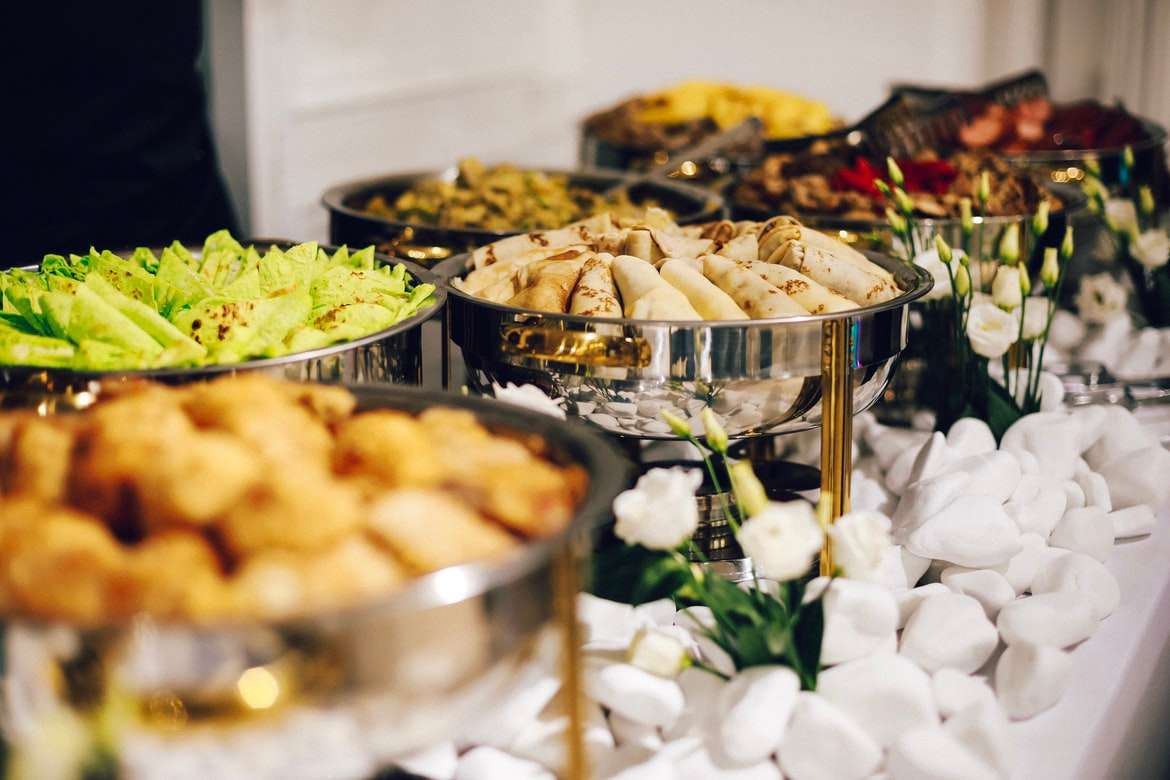Why Catering Insurance Is Critical
Catering businesses juggle numerous risks daily – spoiled food, venue damage, staff injuries, and transit delays. One lawsuit or equipment loss can wipe out your profits or bankrupt your company. Catering insurance provides a financial safety net, keeps clients confident, and is often required by venues and event organizers.
Pro tip: Many clients now ask for a Certificate of Insurance (COI) before booking. No insurance = no gig.
Core Insurance Coverages for Caterers
1. General Liability Insurance
- Protects against: Third-party injuries, property damage, legal fees.
- Real example: A guest trips over your chafing dish setup and breaks a wrist. You’re sued for $20,000. This policy covers medical costs and legal defense.
Related: How Much is General Liability Insurance?
2. Product Liability Insurance
- Protects against: Illness or allergic reactions from your food.
- Example: A customer suffers a severe nut allergy reaction after eating a mislabeled dish. You’re liable for medical bills and damages.
3. Commercial Property Insurance
- Protects: Kitchen equipment, inventory, furniture, and premises.
- Example: A grease fire destroys your prep kitchen and walk-in freezer. This policy covers repairs and replacement.
4. Commercial Auto Insurance
- Protects: Catering vans, delivery trucks, staff vehicles used for business.
- Example: Your delivery van is sideswiped en route to a wedding. This covers repairs and any liability for injured parties.
Related: Commercial Auto Insurance Explained
5. Workers’ Compensation Insurance
- Required in most states
- Covers: medical care and wages for injured employees.
- Example: A chef slips on a wet floor, injures their back, and is out for three weeks. Workers’ comp pays their salary and medical bills.
Read more: Workers’ Compensation Insurance – Complete Guide
6. Liquor Liability Insurance
- Required if you serve alcohol
- Covers: Damages from intoxicated guests.
- Example: A drunk guest gets into a car accident after your event. You are partially liable – this policy protects you.
7. Inland Marine Insurance
- Covers: Tools, electronics, and catering gear during transit.
- Example: A heavy rainstorm floods your van and destroys $7,000 worth of serving equipment. Covered.
8. Business Interruption Insurance
- Covers: Lost income if your operations are paused by fire, flood, or similar disaster.
- Example: A storm forces a 2-week kitchen closure. This policy covers the revenue you would have earned.
Specialized Add-On Coverage
Home-Based Caterer Insurance
- Tailored for kitchen-based startups and part-time caterers.
- Combines general liability, product liability, and property protection.
One-Day or Short-Term Catering Insurance
- Ideal for pop-ups, weddings, or festivals.
- Get instant COI, often for less than $100.
Average Catering Insurance Cost
| Coverage Type |
Monthly Avg. |
Annual Avg. |
| General Liability |
$25 – $67 |
$299 – $850 |
| BOP (Liability + Property) |
$40 – $85 |
$480 – $1,020 |
| Workers’ Compensation |
$90 |
$1,084 |
| Commercial Auto |
$164 |
$1,963 |
| Liquor Liability |
$65 |
$780 |
| Cyber Liability (optional) |
$145 |
$1,740 |
Factors that affect cost:
- Number of employees
- Equipment value
- Event size and alcohol service
- Claims history
- Business location
Compare Cheap Small Business Insurance Quotes
Best Catering Insurance Companies
| Provider |
Best For |
Highlights |
| FLIP |
Food-only caterers |
$299/year policies, strong liability focus |
| Thimble |
One-off events |
Hourly/daily coverage, instant COIs |
| NEXT Insurance |
Small business packages |
Fast quotes, modern UX |
| The Hartford |
Full-service caterers |
Established BOPs, strong claims support |
| Progressive |
Commercial auto bundles |
Great for delivery-based operations |
Common Exclusions in Catering Insurance
Even the best policies won’t cover:
- Intentional misconduct (e.g., knowingly serving expired food)
- Illegal activities (e.g., serving alcohol without a license)
- Acts of war or government shutdowns
- Personal use of business vehicles
Always read your policy details or speak to a licensed agent.
Risk Management Tips for Caterers
Want lower premiums and fewer claims? Implement these:
- Use temperature logs for hot/cold food during transit.
- Train staff in safe food handling and customer interactions.
- Regularly maintain vehicles and kitchen equipment.
- Label all food allergens clearly.
- Ask venues for COIs too – shift liability where possible.
How to Choose the Right Catering Insurance Policy
Choosing the right policy isn’t just about finding the lowest premium. It’s about getting coverage that matches the scale, scope, and risk profile of your catering operations. Here’s how to do it smartly:
1. Assess Your Risk Profile
- Event size: Larger events bring higher exposure.
- Alcohol service: Triggers liquor liability and dram shop laws.
- Venue variation: Working in multiple venues means broader general liability is critical.
- Special equipment: Do you use smokers, fryers, or custom rigs that need specific inland marine protection?
2. Choose the Right Carrier Type
- Digital-first providers like NEXT or Thimble are great for fast COIs and low overhead.
- Traditional carriers like The Hartford or Travelers are better for complex, multi-employee operations with higher limits.
3. Don’t Skimp on Liability Limits
Go for at least $1M per occurrence and $2M aggregate, especially if you cater weddings, corporate events, or public venues.
Real Claims Examples to Learn From
Understanding real claims helps you visualize the importance of coverage and avoid mistakes. Here are actual scenarios pulled from catering business forums and case studies:
Example 1: Spoiled Wedding Feast
A power outage at the prep kitchen caused seafood spoilage. The caterer unknowingly served it at a wedding. 14 guests fell ill. The caterer paid $38,000 in settlements and medical bills. Product liability insurance covered all costs.
Example 2: Scalding Injury
A server spilled hot coffee on a guest while navigating a crowded buffet. The guest required skin grafts and sued for $110,000. General liability kicked in, covering legal fees and damages.
Example 3: Stolen Van and Equipment
A catering van loaded for an outdoor brunch was stolen from the hotel parking lot. Without inland marine coverage, the $12,000 loss would have come out of pocket. Thankfully, the owner had a strong BOP (business owner’s policy) with added transit protection.
Compliance Tips: Stay Legal, Stay Covered
A surprising number of caterers void their policies due to basic mistakes. Avoid these:
- Failing to disclose alcohol service – especially at events where bartenders are subcontracted
- Using personal vehicles without notifying your insurer (commercial auto must be in place)
- Not updating employee count – this affects workers’ comp and liability thresholds
- Ignoring local health and fire codes – some policies may exclude claims if you’re found in violation
Catering Insurance for Niche Segments
The catering world isn’t one-size-fits-all. If you operate in a niche, your risks and needs shift:
Food Trucks Offering Catering
You’ll need a combo of mobile food vendor insurance + event liability. Add commercial auto and foodborne illness protection.
See: Food Truck Insurance Guide
Wedding & Event Specialists
High expectations and emotional stress lead to more lawsuits. Opt for higher liability limits, business interruption, and a robust professional liability rider in case of service failure claims.
Private Chefs Offering Drop-Offs
A smaller footprint, but exposure remains. Add inland marine for transit and tools, plus property insurance if you prep from home. Read more on our private chef insurance guide.
Frequently Asked Questions
Q: Do I need catering insurance for one event?
A: Yes. One accident or food poisoning case can lead to costly lawsuits. Short-term insurance is cheap and required by many venues. Providers like Thimble offer short-term policies tailored for single events.
Q: Will my homeowner’s insurance cover catering from home?
A: No. You’ll need a business policy. Otherwise, claims may be denied.
Q: How fast can I get coverage?
A: Instant policies are available through providers like NEXT and Thimble. You can get covered in under 10 minutes.
Q: What if I cater as a side hustle?
A: Even part-timers need coverage. One lawsuit can affect your personal finances.
Q: Is catering insurance mandatory?
A: While not always legally required, many venues and clients mandate proof of insurance before hiring.
Q: Does home-based catering need insurance?
A: Absolutely. Home-based caterers face similar risks and should have appropriate coverage.
Don’t Let One Burnt Tray Ruin Your Buffet of Success – Get Covered & Serve With Confidence.
Catering insurance isn’t optional – it’s essential. From food safety to vehicle damage and client injury, the risks are real. A tailored insurance policy gives you the protection, professionalism, and peace of mind to grow with confidence.
Ready to get covered?
Compare Catering Insurance Quotes Now
Sources & References
- https://www.nextinsurance.com/catering-insurance/
- https://www.thimble.com/industries/catering-insurance
- https://www.hiscox.com/small-business-insurance/catering-insurance
- https://www.thehartford.com/business-insurance/industries/food
- https://www.coverwallet.com/business/catering-insurance
- https://www.sba.gov/business-guide/manage-your-business/stay-legally-compliant/manage-risk
- https://www.irs.gov/businesses/small-businesses-self-employed/business-expenses
- National Association for Catering and Events (NACE)
- Statista – U.S. Catering Services Market Revenue
- Reddit – r/SmallBusiness: Catering Liability Experiences
- ChefTalk Forums: Catering Mishaps and Insurance Claims
- https://www.progressivecommercial.com/business-insurance/caterers/
- https://www.insureon.com/food-beverage-business-insurance





